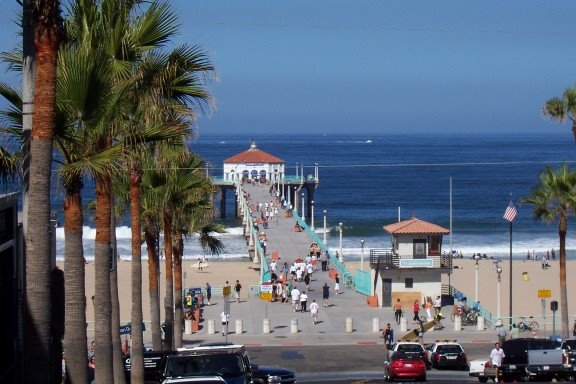
Yesterday will be remembered for a number of reasons... the numerical point drop in the DOW was a first although as a percentage not among the top 10 worst days for the market. Financial stocks dropped and interest rates rose as bond returns nose dived.
I thought the most important aspect was that members of Congress not only reviewed the aspects of the bill but listened to what their constituents had to say on the matter... namely that they don't want to be on the hook for all the bad decisions made by the financial markets.
That doesn't mean there won't be a bailout/rescue of the financial markets because there will be... however it should mean that the new bill will be better crafted with more protection for the taxpayer. The problem is that just handing a blank check to Wall Street is never a smart idea and in this instance would be throwing good money after bad. I think Paulson should either be fired or not allowed to handle the bailout. I would like to see someone oversee the deal who isn't quite so chummy with the boys on the street.
The lack of liquidity is what is causing most of the problems in the market. My resources* believe it is not a lack of money but rather a fear of correctly assessing risk that is paralyzing the markets. My main concern about the bailout is that while the financial sector is screaming for a handout I didn't see anything that promises that if we help the markets out they will reciprocate by loosening up the credit markets. For the last year the FED has been throwing money into the credit markets with zilch results. Banks have taken the money from the FED and refused to loan it out. Credit has remained very tight.. and I'm not talking about tighter rules/regulations for home loans.
I thought the most important aspect was that members of Congress not only reviewed the aspects of the bill but listened to what their constituents had to say on the matter... namely that they don't want to be on the hook for all the bad decisions made by the financial markets.
That doesn't mean there won't be a bailout/rescue of the financial markets because there will be... however it should mean that the new bill will be better crafted with more protection for the taxpayer. The problem is that just handing a blank check to Wall Street is never a smart idea and in this instance would be throwing good money after bad. I think Paulson should either be fired or not allowed to handle the bailout. I would like to see someone oversee the deal who isn't quite so chummy with the boys on the street.
The lack of liquidity is what is causing most of the problems in the market. My resources* believe it is not a lack of money but rather a fear of correctly assessing risk that is paralyzing the markets. My main concern about the bailout is that while the financial sector is screaming for a handout I didn't see anything that promises that if we help the markets out they will reciprocate by loosening up the credit markets. For the last year the FED has been throwing money into the credit markets with zilch results. Banks have taken the money from the FED and refused to loan it out. Credit has remained very tight.. and I'm not talking about tighter rules/regulations for home loans.
If you own a business you know that in the last year it has been difficult to obtain a short term loan to pay your bills or expand your company. In the last two weeks banks have even stopped lending to each other which is a very bad sign. This is what happened in '79-'81. There was simply no money available for home loans or any other loan. If you were lucky enough to get credit you paid a very hefty price 17.5% for a home loan and a prime rate around 20%. We really don't want to return to the good old days.
Subprime loans have been cast as the bogeyman but it was not so much the failure of the subprime loans themselves as it was what the financial markets did with them that has caused the meltdown. The media makes you think that 90% of the homes in America are facing foreclosure and that's not true. The California real estate market fell partly due to foreclosures in markets where subprime loans made up a majority of the loans and partly because it was time for a market shift.
Real Estate markets in California historically operate on a 10 year cycle. It is a maximum that what goes up must come down... even in Manhattan Beach. What drives people nuts about the Beach Cities is that they rarely drop as much as other markets and consequently remain higher priced even in a down market compared to neighboring areas. It's not that the Beach Cities are immune from market forces they aren't... but as these areas face high demand they maintain overall values better.
I would really like to see Congress lose the political speak and concentrate on crafting a bill that may accomplish the goal of keeping the markets in check. Truthfully, I don't know if it can be done. I do know that giving the markets everything they demand is very bad policy... as is trying to prop up a real estate market that needs to finish the process of getting rid of bad loans and homeowners who should not be homeowners. It will be interesting to see if anyone is smarter this week then they were last week...
* Kim Rupert ...."There's so much liquidity in the system -- unfortunately, the liquidity is not opening up lenders at all," said Kim Rupert, managing director of global fixed income analysis at Action Economics. "It's the epitome of credit turmoil. There's too much fear in the market. Everybody is hoarding their cash, hoarding their reserves, not trading funds with each other."





4 comments:
I dont know if its a good moment to invest now in the States, what do you think?
I really want that information, becouse ive been saving money for a while...
Cheers!!!
flats4you,
That depends on what you want from an investment... and on what happens over the next few weeks with the economy.
A lot of people have made money by buying in a down market and holding the investment. If you are looking for something long term 5-10 years and want a fixed interest rate then now might not be a bad time as rates are low and you can negotiate price...
However if you are looking at a short term flip then this is not a good time even with low rates.
The U.S. has always been a good bet if you are looking for stability. We do face short term challenges from time to time but it's hard to find a more stable country over the long run.
Kaye- You have said numerous times that if the ecomony goes into a recession and unemployment rises, all bets are off and the south bay housing market could be in trouble. At this point, wouldn't you say we are there? I would think that in the near future buying a house would be a very bad idea.
Anonymous 1:30,
No question that if we wind up in a major recession and people are out of work in the South Bay then you are going to see prices go down and we could see an uptick in foreclosures.
I have always maintained that buying a home is a personal decision. I don't believe there is a good or bad time to buy... you buy a home when you need to buy one. That said there are certainly times that are better or worse in any market cycle. Buying at the top of the market is one you want to miss if possible... but I did that and have seen my place go up in value well over what I paid.
Buying in the first part of a market trending downward is also not the best of times if it can be avoided. Buying when interest rates are very high could be bad as this could mean prices might drop more. Then again the opposite could also be considered risky...buying when rates are very very low could be bad because you will be paying a premium for the property.
The truth is that there are probably very few times when the consensus from all parties point to a good time to buy.
Buying a home is a long term investment... 5-7 years is the time you should plan on holding. If you do that you will almost always be fine no matter when you buy.
However if you are looking at a short term... less then 2 years then you may well lose money even if prices remain flat because of the cost of selling... so this might not be the best time for you to buy if you are a short term buyer.
Post a Comment